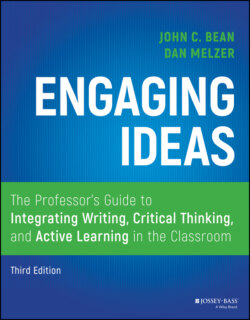Читать книгу Engaging Ideas - John C. Bean - Страница 74
Genre Awareness Promotes Transfer
ОглавлениеLet's look first at the particularly puzzling problem of why students have difficulty transferring writing skills from one course to the next. A student who produces strong papers in a first‐year composition course may struggle with a political science or art history paper. Students often produce remarkably uneven writing performances from course to course, making it hard to determine whether any given student is a “good writer” or even whether the student is making progress in writing. In fact, one writing theorist, Lee Ann Carroll (2002), drawing on the psychological development theory of Urie Bronfenbrenner, argues that writing improvement should be measured not by students' ability to produce increasingly better papers on the same kind of assignment but instead by the ability to produce flawed but passable papers on increasingly diverse and complex assignments within a variety of rhetorical contexts:
The college students in my study … did not necessarily get better at some predetermined type of academic writing. Instead, they acquired a “more extended differentiated, and valid conception of the ecological environment” (Bronfenbrenner, 1979, p. 27). These successful students learned to accommodate the often unarticulated expectations of their professor readers, to imitate disciplinary discourse, and, as juniors and seniors, to write in forms more diverse and complex than those they could produce when they entered college. (Carroll, 2002, 22)
Carroll's research suggests the importance of introducing students to increasingly “diverse and complex” forms. Research in genre theory suggests that this developmental process can be facilitated by greater genre awareness. Both students and instructors need to understand that the criteria for good writing are contextualized within genres—an insight that runs counter to the common belief that “good writing is good writing.” As Chris Thaiss and Terry Myers Zawacki (2006) have shown, teachers may not realize how much their views about good writing are shaped by their own disciplinary or subdisciplinary genres. Although teachers across the curriculum tend to describe good writing in the same way—exhorting their students to write “clear prose” with a “strong thesis” and “well‐organized paragraphs”—they often aren't envisioning the same thing. When Thaiss and Myers Zawacki interviewed teachers about their assignments, they discovered underlying differences in the definition of good writing. They argue that bringing these differences to the surface and explaining them to students helps students transfer their writing knowledge from one context to another.
This insight suggests that students benefit when instructors explain specific features of a required genre and differentiate these features from those of other genres. Instead of saying, “Be sure to use evidence to support your thesis,” a teacher can be more helpful by explaining what counts for evidence in a particular disciplinary genre. Thus a sociology professor who has just assigned a research project on gendered differences in behavior (say, snacking habits at a party) might tell students: “Whereas in your history course you probably used quotations from primary sources to support your point, for this sociology assignment your evidence will come from close observation of different genders at the snack table. You'll need to learn to observe gender differences in behavior (if any) and describe them in sociological language.” This explanation, in helping students understand what makes a sociology paper different from a history paper, promotes transfer of a generic skill (using evidence to support a point) from one discipline to another.
A particularly cogent example of disciplinary difference comes from Nowacek (2009), who shows how a literature professor and a history professor view the term thesis statement differently. The literature professor wants students to write an explicitly argumentative thesis that “sticks its neck out.” By contrast, the history professor, downplaying agonistic argument, wants a student's thesis to emerge from research in primary sources. As the history professor puts it, “You don't set out to prove something; you set out to see where the evidence leads you” (500). Consequently, the history professor doesn't insist on an argumentative thesis in the introduction. In fact, the thesis might not be stated explicitly until the end, or it might simply be implied. Nowacek shows how these differences emerge from deeper disciplinary differences, particularly the history professor's belief that “historians like to think that they're finding reality” (505) in contrast to the literature professor's emphasis on the student's interpretive stance. Nowacek argues that students can transfer knowledge more effectively when teachers make these disciplinary differences explicit rather than implying that teachers mean the same thing by thesis statement.
In the following list, we attempt to summarize the advice of various genre theorists about the use of different genres as students progress through the curriculum (see especially Bawarshi, 2003; Beaufort, 2007; Carroll, 2002):
Advice to teachers of first‐year composition. Ask students to analyze different genres and to write in several different genres in order to develop rhetorical flexibility and to practice adjusting their writing to different rhetorical contexts. Learning to analyze different genres helps students size up a new rhetorical context and adapt to its demands.
Advice to teachers of general education courses or early courses in the major. Show students how writing in your discipline may differ from the writing they have done previously. Often teachers can develop short assignments to teach students how disciplinary experts incorporate evidence into an argument, whether in the form of textual quotation, field or laboratory observation, data displayed in tables or graphs, or other strategies. Also by stressing what may be similar to what students did in first‐year composition, teachers can show the skills and knowledge that transfer.
Advice to teachers of advanced courses in the major. Help students learn to write in one or more of the primary genres of the discipline, perhaps leading to a capstone paper in the senior year. Chapter 10 on undergraduate research focuses on how to help students move from novice to disciplinary expert.
